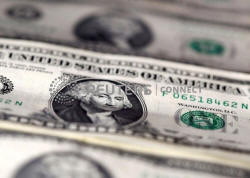Election jitters, Trump health keep dollar in tight range
 Send a link to a friend
Send a link to a friend
 [October 05, 2020] By
Elizabeth Howcroft [October 05, 2020] By
Elizabeth Howcroft
LONDON (Reuters) - The dollar index slipped
on Monday and riskier currencies gained, as financial markets waited for
news about U.S. President Donald Trump's health and developments in
fiscal aid talks in Washington.
Trump said on Friday he had tested positive for COVID-19, triggering
investor flight to safer assets and a stock market sell-off, as the news
added an extra layer of uncertainty to the Nov. 3 presidential
elections.
But early during the Asian session, Trump made a surprise appearance in
a motorcade outside the hospital where he is being treated, which helped
improve risk appetite.
He could be discharged from the hospital today, according to his
doctors.

The Australian dollar - a liquid proxy for risk - was up and the safe
Japanese yen was down, suggesting an improvement in risk appetite, but
the moves in the dollar were less clear-cut because there is no
consensus on how the U.S. election's outcome would affect the dollar.
"The jury is out. There isn’t a clear consensus on how the dollar should
trade on this degree of political uncertainty in the U.S.," said Jane
Foley, senior FX strategist at Rabobank.
The dollar slipped against a basket of currencies, and was down 0.2% on
the day at 93.658 at 1040 GMT <=USD>.
The dollar rose 0.3% against the yen to 105.66 at 1042 GMT. Dollar-yen
saw its sharpest fall in more than a month on Friday <JPY=EBS>.
"FX traders cannot agree on how to interpret the recent news flow,"
Ulrich Leuchtmann, Commerzbank's head of FX and commodity strategy,
said.
"The biggest issue for the FX market is: it is uncertain whether this
has made the biggest risk of the U.S elections – a long political and
legal battle about the result – any more or less likely," he said.
"A battle of this nature is only likely if the contender Joe Biden
wins," he added. "That might have become more likely."
Trump's illness has not led to an outpouring of support for him beyond
his core group of followers, as a majority of Americans think he could
have avoided the infection if he had taken the virus more seriously, a
Reuters/Ipsos poll showed.
[to top of second column] |

U.S. dollar notes are seen in this November 7, 2016 picture
illustration. REUTERS/Dado Ruvic/Illustration/File Photo

Goldman Sachs analysts said in a note to clients they were holding off on
recommending more dollar short positions, as they wait for more information
about how Trump's health will affect the election.
Investors are waiting for developments in talks in Washington about a
coronavirus relief package after U.S. House Speaker Nancy Pelosi on Sunday
reported progress in the discussions.
Rabobank's Foley said that if progress is made on the coronavirus relief funds
then that would provide a more clear-cut boost to markets' risk appetite.
The Australian dollar was up 0.3% at 0.71815 at 1053 GMT <AUD=D3>, while the New
Zealand dollar was flat on the day at 0.6647 <NZD=D3>.
The Reserve Bank of Australia's policy meeting and the Australian budget
announcement are on Tuesday.
Coronavirus restrictions in Auckland will be lifted this week, New Zealand Prime
Minister Jacinda Ardern said.
The euro was up 0.3% at $1.1755 <EUR=EBS>.
The safe haven Swiss franc rose to a 13-day high versus the dollar, lifted by
Japanese tech firm NEC saying it will buy Swiss financial software company
Avaloq Group AG.
At 1055 GMT, euro-Swiss was down 0.1% at 1.0773 <EURCHF=EBS>.
The pound was a touch below $1.30, down 0.1% on the day <GBP=D3>.
Goldman Sachs is advising clients to buy sterling, as it says that a "thin"
trade deal is likely to be struck between Britain and the European Union by
early November.
In focus this week are the U.S. Federal Reserve's meeting minutes due on
Wednesday and European Central Bank meeting minutes on Thursday.
Flash estimates for annual euro zone inflation came in weaker than expected on
Friday, raising pressure on the European Central Bank to increase its stimulus.
(Reporting by Elizabeth Howcroft; Editing by Tomasz Janowski and Bernadette
Baum)
[© 2020 Thomson Reuters. All rights
reserved.] Copyright 2020 Reuters. All rights reserved. This material may not be published,
broadcast, rewritten or redistributed.
Thompson Reuters is solely responsible for this content. |